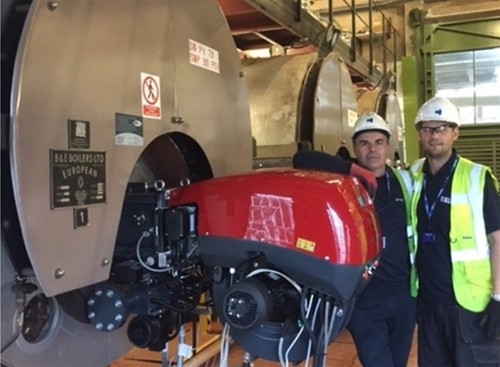The UK’s transition to net zero demands bold, coordinated action, and the heating sector is rightly a focus. As part of this shift, the Department for Energy Security and Net Zero (DESNZ) has proposed raising product standards for space heating, including a requirement for residential liquid-fired combination boilers to modulate their heat output down to 30% by mid-2028.
In this article, Graham Barker, Residential Sales Director at Riello Burners in the UK argues that, while the intent to drive efficiency is welcome, this specific requirement risks moving faster than the market can reasonably support, creating technical, economic, and practical challenges for manufacturers, installers, and homeowners.
Modulation
The concept of modulation – adjusting boiler output to better match heat demand – is a sound one. It can improve comfort and reduce on/off cycling and is now common practice for gas fired appliances. However, applying modulation technology to liquid fuel boilers, particularly in a domestic combination format, introduces far more complexity. One point of note is that liquid fuelled boilers generally have a higher water content than the equivalent gas fired appliance, so they do not require such rapid changes in heat demand as they are able to ‘store’ more water than a low content gas boiler.
In addition, the actual efficiency gains when modulating oil boilers at low loads, particularly in condensing mode, appear marginal. However, that’s not to say modulation is not viable for residential liquid fuelled boilers, but to introduce modulating technology into such appliances is not as straightforward as it is for gas fired appliances and requires a large technological step change which raises important questions about whether this is the most impactful or cost-effective lever to pull in the effort to decarbonise off-grid heating.
One of the stipulations of the DESNZ consultation is that any technology changes should not come at a cost to the consumer. If modulating operation is to become a requirement for all residential liquid fuelled boilers the unfortunate result will be a large increase in appliance costs, in some cases over 100% increase on current costs for consumers. This is evident with current technology available on the market, which does come at a much higher purchasing price.
Installer readiness
There’s also the issue of installer readiness. The heating workforce is already adapting to new technologies like heat pumps, hybrid systems, and smart controls. Introducing complex, niche technologies that require manufacturer-specific training and tools could create new access barriers, slow adoption, and stretch training infrastructure beyond capacity.
I am an advocate for a broader, more flexible approach, one that supports evidence-based policy, aligns with consumer affordability, and keeps the UK on track toward net zero.
A key part of that approach could be accelerating the adoption of renewable liquid fuels such as Hydrotreated Vegetable Oil (HVO). HVO offers up to 88% carbon reduction compared to kerosene, and it has already been successfully trialled in thousands of homes through a self-funded industry programme. Importantly, a modest 20% blend of HVO with existing heating oil could be introduced immediately, delivering meaningful emissions cuts without requiring new hardware, new training, or taxpayer subsidy.
However, it’s important to acknowledge that renewable fuels are not a silver bullet. Their long-term success depends on sustainably sourced feedstocks, transparent supply chains, and policies that ensure fair access across competing sectors like transport and aviation. Any push to adopt renewable liquid fuels must be matched with rigorous standards and forward-looking infrastructure planning.
Path to Net Zero
The path to Net Zero will be complex, and it will require more than one solution. For lasting impact, regulation must work hand in hand with industry, reflect the current capabilities of the market, and pave the way for innovation that is not only technically sound, but commercially viable, socially equitable, and environmentally sustainable.
The liquid fuel heating sector stands ready to innovate. With the right policy signals and a pragmatic, collaborative approach, it can help deliver cleaner, smarter heat to homes across the UK, without leaving anyone behind.
Image provided by Riello

